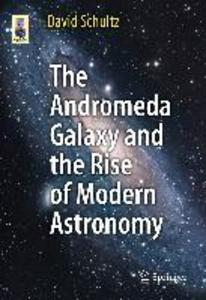
ISBN: 9781461430490
The Andromeda Galaxy – Messier’s M31 – has an almost romantic appeal. It is the most distant object and the only extragalactic object that is visible to the unaided human eye. Now known t… Más…
| Springer.com Nr. 978-1-4614-3049-0. Gastos de envío:Worldwide free shipping, , DE. (EUR 0.00) Details... |

ISBN: 9781461430490
The Andromeda Galaxy - Messier's M31 - has an almost romantic appeal. It is the most distant object and the only extragalactic object that is visible to the unaided human eye. Now known t… Más…
| kobo.com Gastos de envío:Zzgl. Versandkosten., más gastos de envío Details... |

ISBN: 9781461430490
The Andromeda Galaxy and the Rise of Modern Astronomy: ab 37.49 € eBooks > Fachthemen & Wissenschaft > Wissenschaften allgemein Springer-Verlag GmbH eBook als pdf, Springer-Verlag GmbH
| eBook.de Gastos de envío:in stock, , , DE. (EUR 0.00) Details... |

ISBN: 9781461430490
The Andromeda Galaxy and the Rise of Modern Astronomy: ab 37.49 € eBooks > Fachthemen & Wissenschaft > Wissenschaften allgemein Springer-Verlag GmbH, Springer-Verlag GmbH
| eBook.de Gastos de envío:in stock, , , DE. (EUR 0.00) Details... |

2012, ISBN: 9781461430490
eBooks, eBook Download (PDF), 2012, [PU: Springer New York], Springer New York, 2012
| lehmanns.de Gastos de envío:Download sofort lieferbar. (EUR 0.00) Details... |

ISBN: 9781461430490
The Andromeda Galaxy – Messier’s M31 – has an almost romantic appeal. It is the most distant object and the only extragalactic object that is visible to the unaided human eye. Now known t… Más…

ISBN: 9781461430490
The Andromeda Galaxy - Messier's M31 - has an almost romantic appeal. It is the most distant object and the only extragalactic object that is visible to the unaided human eye. Now known t… Más…

ISBN: 9781461430490
The Andromeda Galaxy and the Rise of Modern Astronomy: ab 37.49 € eBooks > Fachthemen & Wissenschaft > Wissenschaften allgemein Springer-Verlag GmbH eBook als pdf, Springer-Verlag GmbH

ISBN: 9781461430490
The Andromeda Galaxy and the Rise of Modern Astronomy: ab 37.49 € eBooks > Fachthemen & Wissenschaft > Wissenschaften allgemein Springer-Verlag GmbH, Springer-Verlag GmbH

2012, ISBN: 9781461430490
eBooks, eBook Download (PDF), 2012, [PU: Springer New York], Springer New York, 2012
Datos bibliográficos del mejor libro coincidente
| Autor: | |
| Título: | |
| ISBN: |
Detalles del libro - The Andromeda Galaxy and the Rise of Modern Astronomy
EAN (ISBN-13): 9781461430490
ISBN (ISBN-10): 1461430496
Año de publicación: 2012
Editorial: Springer New York
271 Páginas
Idioma: eng/Englisch
Libro en la base de datos desde 2012-05-19T02:58:56-05:00 (Mexico City)
Página de detalles modificada por última vez el 2023-12-09T10:28:23-06:00 (Mexico City)
ISBN/EAN: 9781461430490
ISBN - escritura alterna:
1-4614-3049-6, 978-1-4614-3049-0
Mode alterno de escritura y términos de búsqueda relacionados:
Autor del libro: schultz
Título del libro: andromeda galaxy, gala, for andromeda, astronomy, after the galaxy, have never been modern, the rise nine
Datos del la editorial
Autor: David Schultz
Título: Astronomers' Universe; The Andromeda Galaxy and the Rise of Modern Astronomy
Editorial: Springer; Springer US
271 Páginas
Año de publicación: 2012-04-23
New York; NY; US
Idioma: Inglés
39,58 € (DE)
40,70 € (AT)
45,00 CHF (CH)
Available
XII, 271 p. 139 illus., 72 illus. in color.
EA; E107; eBook; Nonbooks, PBS / Physik, Astronomie/Astronomie; Astronomische Beobachtung: Observatorien, Ausrüstungen und Methoden; Verstehen; Andromeda Nebulae; Classification of Galaxies; Edwin Hubble; Extragalactic Astronomy; History of Astronomy; History of Astrophysics; Messier's M31; Milky Way's Twin; Miss Leavitt's Stars; Modern Astronomy; Nineteenth Century Astronomy; Spiral Galaxies; Twentieth Century Astronomy; B; Astronomy, Observations and Techniques; Astronomy, Cosmology and Space Sciences; History of Science; Astrophysics; Physics and Astronomy; Astronomie, Raum und Zeit; Geschichte der Naturwissenschaften; Astrophysik; BC
The Andromeda Galaxy – Messier’s M31 – has an almost romantic appeal. It is the most distant object and the only extragalactic object that is visible to the unaided human eye. Now known to be about 2½ million light-years away, it appears in the sky to be several times the width of the full Moon under good seeing conditions. The Andromeda Galaxy and the Rise of Modern Astronomy examines the astronomical studies of Andromeda and its importance to our developing knowledge of the universe. The book discusses how M31 was described both by the Ancients, but more importantly, by astronomers from the nineteenth century to the present.
While at the start of the twentieth century the universe was thought of as a finite cosmos dominated by the Milky Way, the study of Andromeda galaxy shattered that image, leading ultimately to the conception of an infinite universe of countless galaxies and vast distances. Even today, M31 is a major focal point for new astronomical discoveries, and it also remains one of the most popular (and rewarding) celestial objects for amateur astronomers to observe and study. This book reveals the little-known history of M31 and the scientists who study it.
For all who are interested in astronomy, the skies, and perhaps even the origins of the universe, The Andromeda Galaxy and the Rise of Modern Astronomy provides a first-of-its-kind accessible, informative, and highly readable account of how the study and observation of this celestial object has driven the development of astronomy from ancient times to the present.
Chapter 1: The Wonder of Andromeda Galaxy.- Chapter 2: Early Depictions of Andromeda.- Chapter 3: A Single Closed Theory of the Universe.- Chapter 4: Andromeda and the Technological Revolution in Astronomy.- Chapter 5: Andromeda and Astronomy at the Beginning of the Twentieth Century.- Chapter 6: The Andromeda Nebula and the Great Island-Universe Debate.- Chapter 7: Edwin Hubble, an Infinite Universe, and the Classification of Galaxies.- Chapter 8: Andromeda, Galactic Redshift, and the Big Bang Theory.- Chapter 9: Andromeda, Cosmology, and Post-World War II Astronomy.- Chapter 10: Astronomy and Andromeda at the Close of the Twentieth Century.- Chapter 11: The Andromeda Galaxy.- References.- Andromeda Statistics.- Index.
David Schultz is an avid amateur astronomer with a master's degree in astronomy from James Cook University. He is a Hamline University professor in the School of Business, where he teaches classes in government ethics, public policy, and public administration. He also holds appointments at the Hamline University and Minnesota schools of law, where he teaches election law, professional responsibility, and state constitutional law. Professor Schultz is the author of more than 25 books and 80 articles. In addition to a degree in astronomy, he has a Ph.D. in political science and a law degree from the University of Minnesota, a masters of law from the University of London, a masters degree in political science from Rutgers University, a masters degree in philosophy from Binghamton University, and a bachelors degree in political science and philosophy from Binghamton University.
examines ancient and modern astronomical studies of Andromeda and the galaxy's critical role in the development of the science of astrophysics and our growing knowledge of the universe.
At the start of the twentieth century the universe was thought of as a finite cosmos dominated by the Milky Way. The study of Andromeda shattered that image, leading ultimately to the conception of an infinite universe of countless galaxies and vast distances. Even today, M31 is a major source of new astronomical discoveries, and it also remains one of the most popular (and rewarding) celestial objects for amateur astronomers to observe and study.
provides a first-of-its-kind accessible, informative, and highly readable account of how the study and observation of this celestial object has driven the development of astronomy from ancient times to the present.
The Andromeda Galaxy and the Rise of Modern Astronomy The Andromeda Galaxy and the Rise of Modern AstronomyAn absorbing account of the Milky Way's "galactic twin" Describes how the study of Andromeda Galaxy has led to our current understanding of the nature of the universe and drastically increased our knowledge of the cosmos Focuses on the Andromeda Galaxy from ancient times to the present Draws upon scientific knowledge, amateur astronomy, and pop culture accounts of Andromeda Galaxy to tell the history of astronomy Discusses how new technologies used to study Andromeda have been deployed to explore other objects and expand our knowledge of the Milky Way and the universe Shows how the study of the Andromeda Galaxy was at the center of some of the most contentious debates in astronomy
Más, otros libros, que pueden ser muy parecidos a este:
Último libro similar:
9781461430483 The Andromeda Galaxy and the Rise of Modern Astronomy (Astronomers' Universe) (Schultz, David)
< para archivar...

